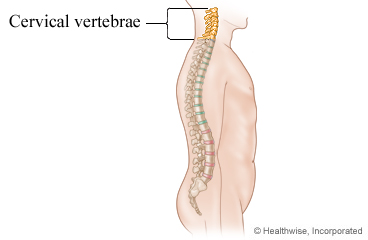Cervical Discectomy: Before Your Surgery

What is cervical discectomy?
A cervical discectomy is surgery to take out damaged tissue from the discs in the neck area of the spine. You might also have bone growths (spurs) pressing on the nerves. The surgery takes pressure off the nerves.
The doctor will take out tissue through a small cut in your neck. This cut is called an incision. It may be on the front of your neck, or it may be along your spine on the back of your neck. If the incision is at the front of your neck, your doctor will put in a small piece of bone between the vertebrae. Small plates and screws may be used to keep the bones in place. This is called fusion. If the incision is at the back of your neck, the extra piece of bone often isn't needed.
You might go home the same day you have surgery. Or you might have a short hospital stay. It usually takes a couple of weeks before you can get back to doing simple activities like light housework, office work, or longer walks. It may take a few months or longer before you can go back to a job that requires heavy labour or back to contact sports or activities where you could fall.
How do you prepare for surgery?
Surgery can be stressful. This information will help you understand what you can expect. And it will help you safely prepare for surgery.
 Preparing for surgery
Preparing for surgery
- You may need to shower or bathe with a special soap the night before and the morning of your surgery. The soap contains chlorhexidine. It reduces the amount of bacteria on your skin that could cause an infection after surgery.
- Be sure you have someone to take you home. Anesthesia and pain medicine will make it unsafe for you to drive or get home on your own.
- Understand exactly what surgery is planned, along with the risks, benefits, and other options.
- If you take a medicine that prevents blood clots, your doctor may tell you to stop taking it before your surgery. Or your doctor may tell you to keep taking it. (These medicines include aspirin and other blood thinners.) Make sure that you understand exactly what your doctor wants you to do.
- Tell your doctor ALL the medicines and natural health products you take. Some may increase the risk of problems during your surgery. Your doctor will tell you if you should stop taking any of them before the surgery and how soon to do it.
- Make sure your doctor and the hospital have a copy of your advance care plan. If you don't have one, you may want to prepare one. It lets others know your health care wishes. It's a good thing to have before any type of surgery or procedure.
What happens on the day of surgery?
Follow the instructions exactly about when to stop eating and drinking. If you don't, your surgery may be cancelled. If your doctor has told you to take your medicines on the day of surgery, take them with only a sip of water.
Take a bath or shower before you come in for your surgery. Do not apply lotions, perfumes, deodorants, or nail polish.
Do not shave the surgical site yourself.
Take off all jewellery and piercings. And take out contact lenses, if you wear them.
At the hospital or surgery centre
Bring a picture ID.
The area for surgery is often marked to make sure there are no errors.
You will be kept comfortable and safe by your anesthesia provider. You will be asleep during the surgery.
The surgery usually takes about 1 to 1½ hours. If you have a spinal fusion at the same time, the surgery will take a little longer.
When should you call your doctor?
- You have questions or concerns.
- You don't understand how to prepare for your surgery.
- You become ill before the surgery (such as fever, flu, or a cold).
- You need to reschedule or have changed your mind about having the surgery.
Where can you learn more?
Go to https://www.healthwise.net/patientEd
Enter F711 in the search box to learn more about "Cervical Discectomy: Before Your Surgery".
Current as of: July 31, 2024
